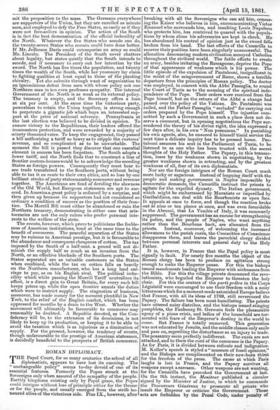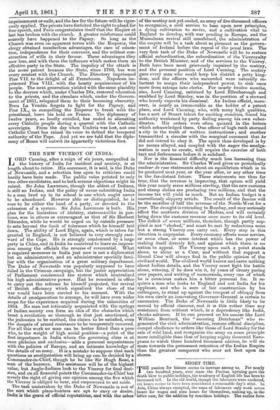ROMAN DIPLOMACY. T HE Papal Court, for so many centuries the
school of all diplomatists, appears to have lost its cunning. The "unchangeable policy" seems to-day devoid of one of its essential features. Formerly the Popes struck at the Sovereigns only when assured of the sympathy of the people. Earthly kingdoms existing only by Papal grace, the Popes could intrigue without loss of principle either for the throne or for the people, and usually emerged from the strife ho- noured allies of the victorious side. Pius IX., however, after breaking with all the Sovereigns who can aid him, censur- ing the Kaiser who believes in him, excommunicating Victor Emanuel who surrounds him, and insulting Louis Napoleon who protects him, has contrived to quarrel with the popula- tions by whom alone his adversaries are kept in check. He has abandoned his control of opinion just as the sword falls broken from his band. The last efforts of the Camarillo to recover their position have been singularly unsuccessful. The allocution denouncing modern civilization annoyed Catholics throughout the civilized world. The futile efforts to create an army, besides irritating the Romagnese, deprive the Pope of that appearance of weakness which is his power. The little episode of the expulsion of Pantaleoni, insignificant in the midst of the misgovernment of Rome, shows a terrible departure from the principles of Roman policy. The doctor was employed, in concert with the Abbe Passaglia, to sound the Court of Turin as to the meaning of the spiritual inde- pendence of the Pope. Their orders were received from the Pope himself, but on the return of the Abbe a change had passed over the policy of the Vatican. Dr. Pantaleoni was exiled, and the Father Passaglia "secluded" for carrying out orders prepared by the Pope himself. The injustice com- mitted by such a Government in such a place does not de- serve a comment, but in opening negotiations the Pope sur- rendered the theory of his divine right, the idea expressed a few days after, in his own "Non possumus." In punishing his own agents, also, he ensured to himself timid service the next time a delicate inquiry has to be pressed home. Pan- taleoni assumes his seat in the Parliament of Turin, to be listened to as one who has been trusted with the secret thoughts of the Holy Father. The Papacy, in this transac- tion, loses by the weakness shown in negotiating, by the greater weakness shown in retracting, and by the greatest weakness of all, fear of its own diplomatists. Nor are the foreign intrigues of the Roman Court much more lucky or sagacious. Instead of leaguing itself with the people and making government in Naples impossible by democratic demands, the Camarillo instruct the priests to agitate for the expelled dynasty. The Italian government, which might be embarrassed by Muratists or imperilled by G-aribaldians, can deal with the Bourbonists as open foes. It appeals at once to force, and though the reaction broke out at nine or ten places at once, and was even formidable in the Abruzzi, that La Vendee of Italy, it was summarily suppressed. The government has an excuse for strengthening its police, and the people of Naples, who want anything rather than the Bourbons back, are alienated from the priests. Instead, moreover, of welcoming the increased allowances to the parish cures, the Committee of Conscience disapproves them, and leaves the parochial clergy divided between personal interests and general duty to the Holy Father.
It is, however, in France that the Papal policy is most signally in fault. For nearly five months the object of the Roman clergy has been to produce an agitation strong enough to make the Emperor pause. For this the bishops issued mandements loading the Emperor with nicknames from the Bible. For this the village priests denounced the revo- lutionists, who beguiled the Emperor to threaten the holy chair. For this the orators of the parti pretre in the Corps Legislatif were encouraged to use their freedom with a noisy bitterness which for a moment made astonished Europe believe that France, with all its ideas of 1789, still reverenced the Papacy. The failure has been most humiliating. The priests have uttered noisy diatribes, and the bishops issued stinging pamphlets, the Faubourg St. Germain feels the pleasurable agony of a pious crisis, and ladies of the household are tor- mented with fears of the Emperor's destiny in the world to come. But France is totally unmoved. This generation was not educated by Jesuits, and the middle classes only smile and pass on, regretting the disturbance as an injury to trade. The peasantry seem perfectly indifferent. The cures are not attacked, and to them the cure of the commune is the Papacy. As for Paris, it is divided between ridicule and indignation. M. Keller's speech is styled a" museum of fossil opinions," and the Bishops are complimented on their new-born thirst for the freedom of the press. The cause at which Paris laughs is lost in France, and the Papacy survives all weapons except a sarcasm. Other weapons are not wanting, for the Camarillo have provoked the Government at last. On the 9th instant, the Moniteur published a circular signed by the Minister of Justice, in which he commands the Procureurs • Generaux to prosecute all priests who insult the Emperor or criticize the Government. Those acts are forbidden by the Penal Code, under penalty of imprisonment or exile, and the law for the future will be vigor- ously applied. The priests have forfeited the right to plead for free speech, and Paris congratulates itself that the Empire at last has broken with the church. A greater misfortune could scarcely have happened to the Papacy. So long as the Church was even on apparent terms with the Emperor, the clergy obtained numberless advantages, the care of educa- tion, independence for their convents, and the mildest con- struction of wills in their favour. These advantages they now lose, and with them the influence which makes them an effective party in the State. The impolicy of the attack is the more patent because the State, since 1789, has won every contest with the Church. The Directory imprisoned Pius VII. to the delight of all Frenchmen. Napoleon im- prisoned Pius VIII. with the hearty acquiescence of his people. The next generation yielded with the same placidity to the decrees which, under Charles Dix, restored education to the priests, and the circulars which, under the Govern- ment of 1831, relegated them to their becoming obscurity. Even La Vendee forgets to fight for the Papacy, and Pius IX., in compelling the Emperor to break with the priesthood, loses his hold on France. The diplomacy of twelve years, so loudly extolled, has ended in alienating every Catholic people during a quarrel with the Catholic sovereigns. From the day. when -Umbria was lost, not one Catholic Court has raised its voice to defend the temporal authority of the Pope. And yet we are told that the diplo- macy of Rome will outwit its apparently victorious foes.































 Previous page
Previous page